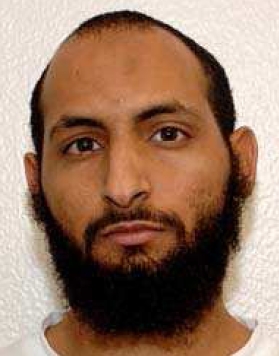
Mahmoud Abd Al Aziz Abd Al Mujahid is a Yemeni citizen who was held in extrajudicial detention in the United States Guantanamo Bay detainment camp, in Cuba, for over fourteen and a half years, from January 11, 2002, to August 15, 2016. His Guantanamo Internment Serial Number is 31. Joint Task Force Guantanamo analysts report that he was born in August 1980, in Taiz, Yemen.

Bashir Nashir Ali Al-Marwalah is a Yemeni, who was captured in Pakistan, on September 11, 2002, and transferred to extrajudicial detention in the United States Guantanamo Bay detention camps, in Cuba. His Guantanamo Internment Serial Number is 837. Joint Task Force Guantanamo counter-terrorism analysts reports that Al-Marwalah was born on December 1, 1979, in Al-Haymah, Yemen.
Saeed Ahmed Mohammed Abdullah Sarem Jarabh is a citizen of Yemen who was held in extrajudicial detention for over fourteen years in the United States Guantanamo Bay Naval Base, in Cuba. Joint Task Force Guantanamo analysts estimate he was born in 1976 in Jeddah, Saudi Arabia.

Musab Omar Ali Al Mudwani is a citizen of Yemen who was held in extrajudicial detention in the United States Guantanamo Bay detainment camps, in Cuba.

Yasin Qasem Muhammad Ismail is a Yemeni held in extrajudicial detention in the United States Guantanamo Bay detainment camps, in Cuba. His Guantanamo Internment Serial Number is 522. Joint Task Force Guantanamo counter-terrorism analysts estimate he was born in 1979, in Ibb, Yemen.

Said Salih Said Nashir is a citizen of Yemen, held in extrajudicial detention in the United States Guantanamo Bay detainment camps, in Cuba. His Internment Serial Number is 841.

Ghaleb Nassar Al Bihani is a citizen of Yemen formerly held in the United States Guantanamo Bay detainment camps, in Cuba. The Department of Defense estimate that he was born in 1979, in Tabuk, Saudi Arabia.

Muhammad Ahmad Abdallah al-Ansi is a citizen of Yemen, held in extrajudicial detention in the United States Guantanamo Bay detention camps, in Cuba. His Guantanamo Internee Security Number is 029. American intelligence analysts estimate he was born in 1975, in Sanaa, Yemen. He was cleared for release on December 9, 2016, a recommendation made public on December 22. He was transferred to Oman with nine other men on January 16, 2017.

Mohammed Ahmad Said Al Edah is a citizen of Yemen who was held in the United States' Guantanamo Bay detainment camps, in Cuba, for fourteen and a half years. His Internment Serial Number is 33. Joint Task Force Guantanamo counter-terrorism analysts estimate he was born in 1962, in Hay al-Turbawi Ta'iz, Yemen.

Ha'il Aziz Ahmad Al Maythal is a citizen of Yemen, who was held in extrajudicial detention in the United States Guantanamo Bay detention camp, in Cuba. American intelligence analysts estimate that he was born in 1977, in Zemar, Yemen.
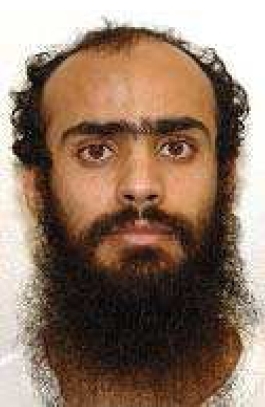
Ali Ahmad Muhammad Al Rahizi is a citizen of Yemen who was held in extrajudicial detention in the United States Guantanamo Bay detainment camps, in Cuba. His Guantanamo Internment Serial Number is 45. Joint Task Force Guantanamo counter-terrorism analysts reports he was born on October 13, 1979, in Taiz, Yemen.
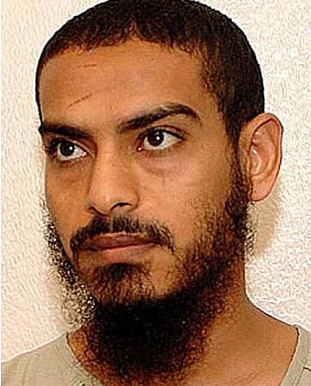
Mustafa Abd al-Qawi Abd al-Aziz al-Shamiri is a citizen of Yemen who was held in extrajudicial detention in the United States Guantanamo Bay detainment camp in Cuba. Al Shamiri's Guantanamo detainee ID number is 434. The Department of Defense reports that Al Shamiri was born on July 7, 1978, in Sanaa, Yemen. He was released and sent to Oman with nine other men, on January 16, 2017.

Fayiz Ahmad Yahia Suleiman is a citizen of Yemen who was held without charge in the Guantanamo Bay detention camps, in Cuba for 14 years and 160 days. He was transferred to Italy on July 10, 2016.

Ravil Kamilevich Mingazov is a citizen of Russia who was held in extrajudicial detention for almost fifteen years in the United States's Guantanamo Bay detention camps, in Cuba. The Department of Defense reports that Mingazov was born on December 5, 1967, in Bolsheretski, Russia.

Ayoub Murshid Ali Saleh is a citizen of Yemen who was held in extrajudicial detention in the United States Guantanamo Bay detainment camps, in Cuba. His Guantanamo Internment Serial Number is 836. The Department of Defense reports that he was born on April 29, 1978, in Usabee, Yemen.

Abdul Latif Nasir is a Moroccan man formerly held in administrative detention in the United States Guantanamo Bay detention camps, in Cuba. His Guantanamo Internment Serial Number was 244. Joint Task Force Guantanamo counter-terrorism analysts report he was born on March 4, 1965, in Casablanca, Morocco. Abdul Latif Nasir and Sufyian Barhoumi tried to file emergency requests to be transferred from Guantanamo in the final days of Barack Obama's presidency.
In late 2008, the Department of Defense published a list of the Guantanamo captives who died in custody, were freed, or were repatriated to the custody of another country. The list was drafted on October 8, 2008, and was published on November 26, 2008. Subsequently almost two hundred more captives have been released or transferred, and several more have died in custody.
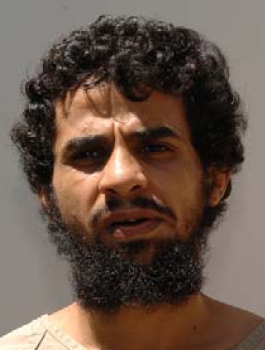
Mohammad Al Rahman Al Shumrani is a citizen of Saudi Arabia who was held in the United States Guantanamo Bay Naval Base, in Cuba. His Guantanamo Internment Serial Number was 195.
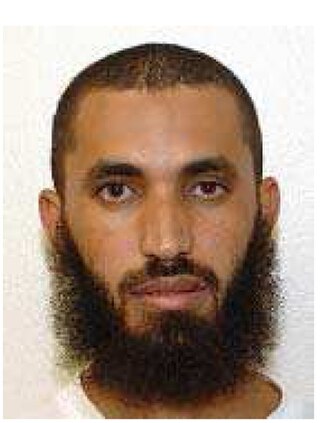
Abdel Malik Ahmed Abdel Wahab Al Rahabi is a citizen of Yemen who was held in extrajudicial detention by the United States from December 2001 to June 22, 2016. He was one of the first twenty captives transferred to the Guantanamo Bay detention camps, in Cuba, on January 11, 2002, and was held there until he was transferred to Montenegro, which granted him political asylum.


















